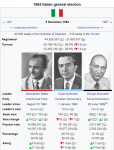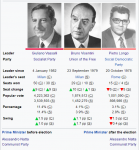- Location
- Op een dag, Nederland.
- Pronouns
- she/her & ne/nem

Perhaps under a man who was once Trotskyite than once Director of Public Prosecutions could such a hash of a compromise happen. After one too much scandal of the King still continuing his old interfering ways, and with a press less likely to be charitable to someone who attracted far less love than his dearly departed mother, the Firm entered what the old mater would have described as an 'annus horribilis'. Republic became less of a fringe concept, but the idea of Charles being pressured into abdication, or the Parliament just outright doing a "we have revoked the crown" move, was far more considered.
The Prime Minister was forced in mid 2025 to move to deal with this growing crisis, and he did so through a very unorthodox concept. He knew the King had undue influence in matters, but was loath to turn Britain republican (such a thought was in his head associated with the more and more fringe SCG). With a comfortable Labour majority, he had freedom to shape the Parliament's response, and his idea was to divide the traditional role of monarch into two. A King who would be the symbolic head, and a new office, a President perhaps, who would take on the actual roles. The King would do the symbolic acts, but the President would take on the remaining ones of substance, while the Commons would be explicitly empowered to choose the government.
The Presidency Bill of 2025 became the Presidency Act 2026, with the King signing it resignedly, creating a new office and a new status quo. The President, the PM determined, would have to be someone of wide respect and with a strong streak of working with all parties. On the 17th of March, the Prime Minister announced his choice was confirmed by the King (as per the Presidency Act) and that it was the Lord Patten, now the President Patten.
Later on, when the Prime Minister met with the President of the USA at a diplomatic conference, this exchange could be heard.
"So, Mr. Prime Minister, who is the head of state? Is Britain now a republic?"
"Well, President Harris, yes... and no."
Harris blinks
"You see, the King is the head of state. And the President is the head of state. They both have different responsibilities."
"And how does this work, Mr. Prime Minister?"
"Beats me. I wrote the Act myself one night, and not even I know how it works."
[Credit to Lord Roem who once used "Christopher, President Patten" in a post which got my head spinning]









